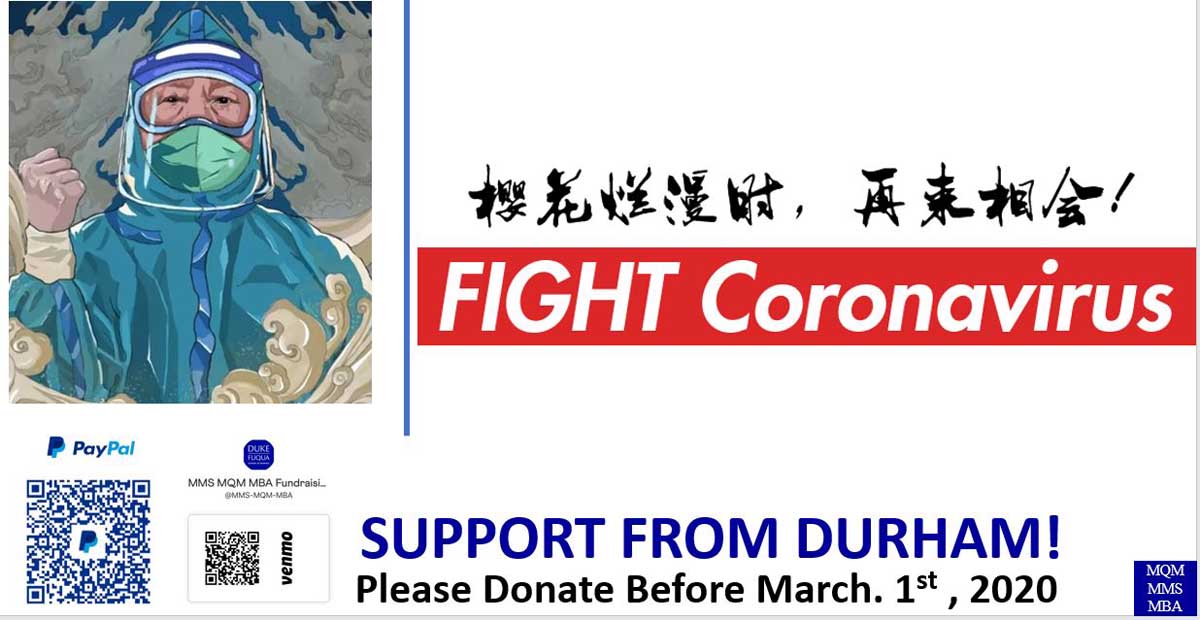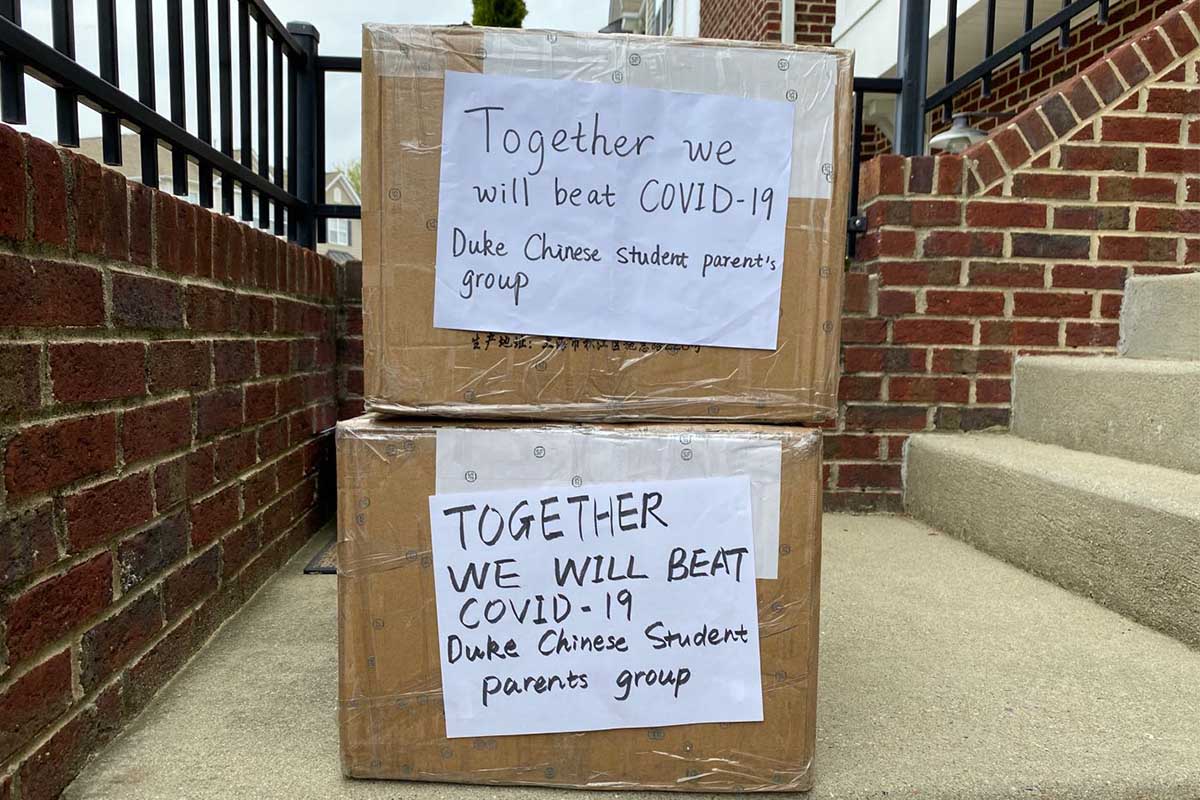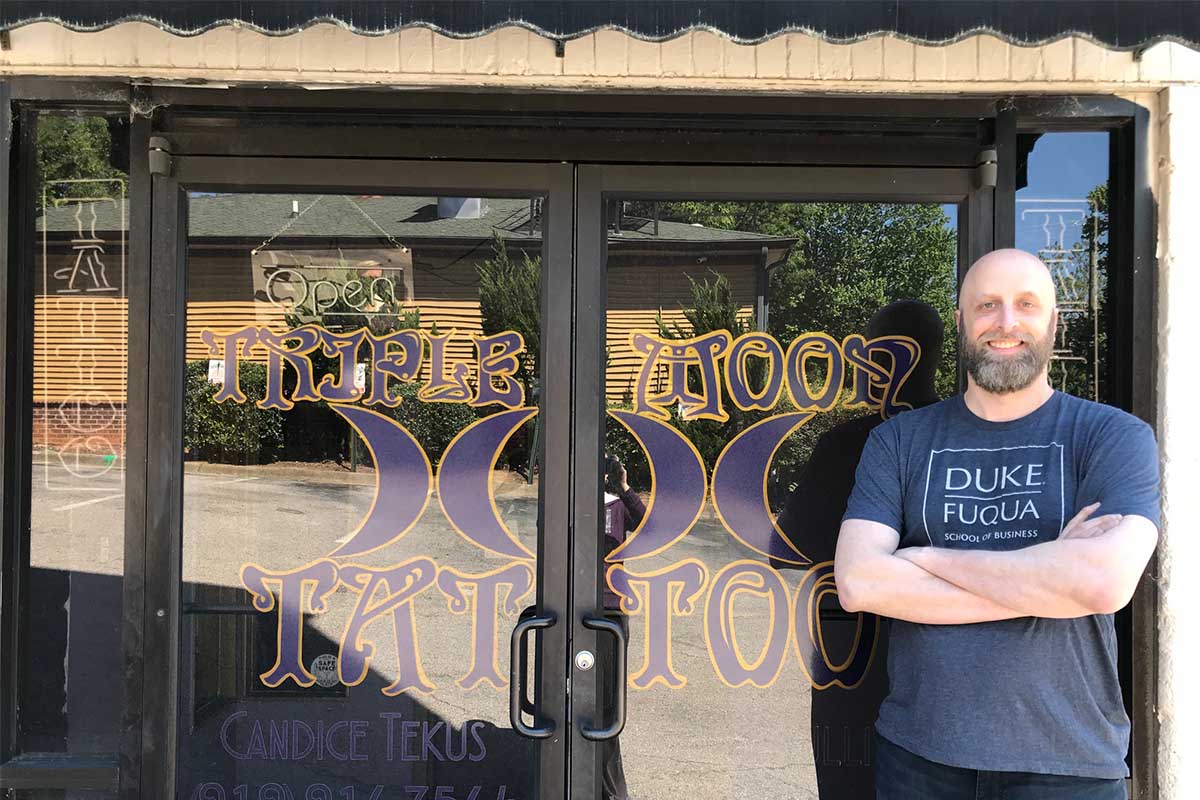Before sheltering-in-place became a normal part of life in the United States, Fuqua students, faculty and staff were organizing relief efforts to help those most in need as a result of the COVID-19 pandemic.
Groups of volunteers, across numerous Fuqua programs, offered aid to China as well as to people in the U.S. Many have benefited, including frontline medical workers at the hardest hit hospitals. Initiatives to help support small businesses and entrepreneurs amid the economic downturn remain ongoing.
Here are a few of those stories.
Covid Promise
“BUY SOMETHING! SPEND MONEY! (If you’re able...).” This is the fervent advice of Assistant Dean Jeremy Petranka of Fuqua’s Masters of Quantitative Management program. “I bought a tattoo in advance from my local parlor. I have no idea when I will get it but we have to make the effort.”
Petranka is the economic advisor to the nonprofit Covid Promise, a grassroots effort founded by Aaron Poynton, a 2016 graduate of Fuqua’s Global Executive MBA program.

A former student of Petranka’s, Poynton created Covid Promise to, “Spread the promise, not the virus” through corporate and consumer, “promises” or pledges. The website is a platform to create awareness and inspire confidence in rebuilding the economy.
Sample promises range from an individual making face masks for the local medical community, free of charge, to landlords waiving the base rent for tenants, to help small businesses.
Poynton started the non-profit after returning from a business trip overseas to a radically different America, brought on by the COVID-19 pandemic. “As an econ guy, my thinking immediately turned to the business aspects, and the tremendous anxiety that has taken hold,” said Poynton.
Hundreds of promises have been made and the Facebook page has reached more than 135,000 people. Covid Promise assisted the Small Business Administration (SBA) in publishing information on lost loans. Through Covid Promises’ website, the SBA’s message reached thousands of small businesses, advising to reapply for the loans before the money ran out.
“While things are certainly hard right now, they don’t need to be any more difficult,” said Petranka. “Covid Promise is the direct effect of people stepping up in big and small ways and I couldn’t be any prouder of our amazing alumni for leading this charge.”
Connecting Small Business to Help
As the faculty director of the Center for the Advancement of Social Entrepreneurship known as CASE, Cathy Clark is concerned about the effects the COVID-19 pandemic is having on entrepreneurs and small businesses. “I saw that it was hard to find cash resources and I’d heard of local businesses closing,” said Clark.

To combat the dire economic outlook, Clark created CovidCap.com, a searchable database for global, national and regional capital sources for both nonprofit and for-profit entrepreneurs. The tool includes offerings from states, municipalities and national governments. The database highlights more than 500 different capital relief listings, worth more than $1 trillion, consisting of grants, loans and global relief.
Four days after developing the concept in late March, Clark made the website live. “Every minute counts when you are running out of cash. It’s up to everyone to share with local businesses and their networks ASAP,” said Clark.
Clark leads a small but nimble team of 6 volunteers, organizing information in real time for the public. She leveraged the CASE i3 advisory board in her effort, made up of impact investors, advisors and asset managers from all over the world. The response was immediate with offers of links, lists and people that could donate their time and talents. CASE has also joined an alliance created by the World Economic Forum. COVIDCAP.com is featured on this other website, helping to coordinate the response for social entrepreneurs.
Clark agrees the money getting into the hands of those most in need remains priority number one. In the long-term, she will look at the tool through a resource lens to identify the sources of capital that had the greatest impact and whether the intended audiences received the information.
Raising Money for Medical Supplies

Daewe Kim, a student in the Master of Quantitative Management program, organized COVID-19 relief efforts before the pandemic landed in the U.S. In February, he partnered with other Fuqua student groups to collect money and supplies to send to Wuhan, China, the epicenter of the outbreak.
Because Kim speaks fluent Chinese, he eliminated some of the obstacles involved in sending medical devices and equipment overseas. ECG monitors, non-invasive ventilators, plasma and UV air sterilizers were all purchased at fair market value at a time when price gouging and limited quantities were soon becoming the norm.
Five boxes of goggles were sent to hospitals in New York and 2,000 units of N95 masks were delivered to Duke Health. Kim estimates the equipment sent to China and the U.S. totaled more than $59,000.

Kim’s co-organizers and fellow classmates, Ying Bao, Ding Hao and Qian Li, along with other Duke and Fuqua student and alumni organizations in the U.S. and China, worked together to expand the fundraisers’ reach and increase the amount of aid distributed.
“I am forever grateful and proud to have been a part of this amazing effort that involved so many people and various Duke organizations,” said Kim.
